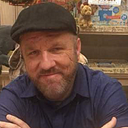‘World Goes Round’: Frank Musker and Jeff Hull Discuss Rediscovered 80’s Musical Time Capsule
Back in 1989 a behind the scenes group of renowned songwriters and studio musicians, Frank Musker (Queen, The Babys, Air Supply), Elizabeth Lamers (John Denver, Linda Ronstadt, Christopher Cross), Jeff Hull (Brenda Russell, Heart, Chaka Kahn) and Marty Walsh (Donna Summer, Eddie Money, Sheena Easton), decided to get together to record an album. The result was World Goes Round, a powerful collection of pop, inspiration and creativity.
As artists who, at the time, were also heavily involved on other projects, the album was eventually shelved and would remain unheard for more than thirty years. It wasn’t until guitarist, Marty Walsh, found a cassette tape of the tracks in his basement that the music of World Goes Round is finally seeing the light of day.
The ten-track album, produced by Tommy Vicari (Prince, Billy Idol) and fueled by the infectious lead single, “Big House,” was digitally transferred using 21st century technology. A product of its era conceived in a pressure free setting, World Goes Round sounds as fresh and relevant now as it did more than three decades ago.
I recently spoke with Frank Musker and Jeff Hull about uncovering the World Goes Round time capsule and more in this exclusive new interview.
How did the music of World Goes Round finally see the light of day after all this time?
Jeff Hull: It was when our guitar player, Marty, found the cassette in his basement, listened to some of the tracks and then sent them to everyone. It’d been thirty years since any of us has heard it. What’s interesting is that we weren’t able to find the original multi-track of the recordings. So, we went in and remastered from cassette. We were amazed at how good it sounded.
How did World Goes Round originally come together?
Frank Musker: I had a house and studio in Laurel Canyon where we would have sessions and worked with A-list players. I was in a relationship with Elizabeth at the time and we were always making music. Elizabeth had been working with Marty Walsh and we were always letting other people use the studio as well. One day, I heard Jeff playing and knew right away I wanted to put him in my orbit. We were all having a lot of success individually but not really making the records we wanted to make. We didn’t have an impetus of creating a working band. We just wanted to make an album that would satisfy our need of depth and personality. When I listen to these songs now, all these years later, they still sound amazing.
JH: I remember we initially started writing with no intention of ever becoming a band. We just wanted to write songs. Then one thing led to another. We even did a photo shoot.
Why was the project shelved?
JH: Back then you had to make a living, and we were all musicians working with other people. Everyone’s attention span was short. I think we shopped it a little but got sidetracked and went on to other projects and eventually went our separate ways.
What was the inspiration behind the song, “Big House?”
FM: We wanted to write about what was going on in the world and “Big House” was just one aspect of that. I had gone to the Amazon a few times and fell in love with South America. It shook me to the core to discover that so much of it was disappearing. It was a wakeup call. I had the idea of all these people living in a wonderful house on a hill in L.A., partying away while the rest of the town below was getting choked with pollution.
JH: It’s a product of its era. We were trying to make good marketable music. One cool thing about being immersed in it for so long and then coming back to it years later is that hear it with different ears but it’s still relevant.
What was the writing process like?
FM: Ideas come from everywhere but in the case of “Big House” it was conceptually driven because I had a very specific idea about the big house on the hill. Jeff and I started writing and then Marty joined in. We wanted to make music that was organic and that people could dance to but wanted the lyrics to be more cautious and aware.
Now that there’s renewed interest do you foresee a possible World Goes Round reunion?
FM: That’s the beautiful thing. This is a no pressure gig so anything is possible. We’re delighted that it’s found an audience after all these years. At the same time, thirty years later, we’re still great friends and I still have faith in our musical ability as a group.
JH: If there’s interest that would be great. We’re all different people now but we’ve gotten such good response and things keep falling into place. We’re taking it a step at a time.
What excites you the most about the release of this newly rediscovered album?
JH: We’ve all worked on a lot of good stuff that hasn’t seen the light of day until now. I’m pleased there’s excitement around this album and that it’s finally out there getting heard.
FM: We had such a good time making this record because there was no record company or committee involved. It was a very creative time. The reaction has been sensational and we’re loving that people are enjoying this record. In a strange way it sounds more relevant now than ever. It’s interesting how a cassette from Marty’s basement can suddenly come back to life.
